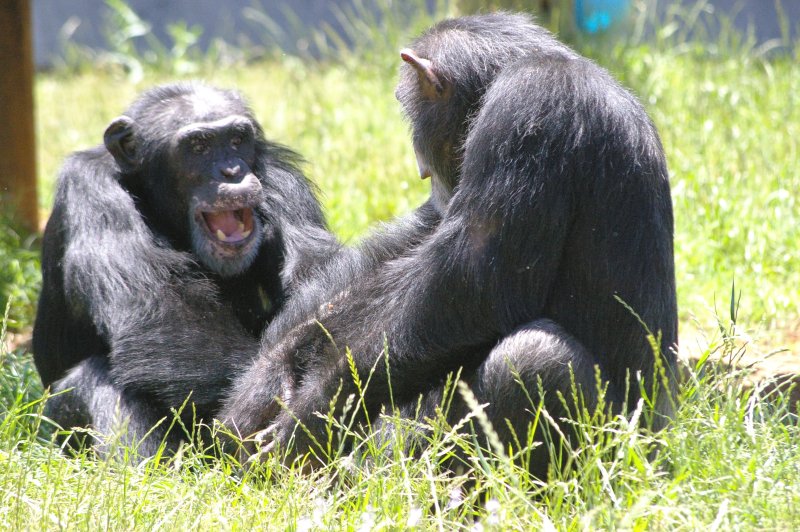Chimpanzees at Chimp Haven are grooming and playing with one another. They will soon be joined by more retired research chimps. The remaining 50 federal research chimpanzees are headed to the Louisiana sanctuary, the NIH announced on Wednesday, November 19, 2015. File photo by UPI/Chimp Haven
WASHINGTON, Nov. 19 (UPI) -- The National Institutes of Health is retiring its remaining 50 research chimpanzees. The apes will live out their days in animal sanctuaries.
NIH director Francis Collins told the agency's administrators about the move earlier this week and made the decision public on Wednesday evening.
"I think this is the natural next step of what has been a very thoughtful five-year process of trying to come to terms with the benefits and risks of trying to perform research with these very special animals," Collins told Nature. "We reached a point where in that five years the need for research has essentially shrunk to zero."
Collins said the agency will also work to phase out the use of research chimps that are supported by NIH programming but not legally owned by NIH.
The agency's chimpanzee research program has shrunk in recent years. In 2013, all but 50 of its 360 chimps were phased out. Most of the apes were relocated to Chimp Haven, a federally sanctioned sanctuary in Louisiana. Collins said no one had applied to use the apes in more than two years.
In a phone call with reporters, Collins stressed the decision was species specific, and that NIH would continue to support research using other apes and monkeys. Chimps are humans' closest living genetic relative.
"This in no way says NIH is in any way backing off on the need to (conduct) research on other non-human primates," Collins said. "This is solely a question of research on chimpanzees."
Animal rights groups applauded the move, but Collins said the agency's decision was in no way influenced by the complaints of animal advocates. Last month, PETA sent letters to Collins' neighbors calling on them to approach the director and voice their displeasure with the agency's plans to separate baby monkeys from their parents in an effort to study the health effects of stress in infants.
"I was deeply troubled that PETA would take that tack ... and making it personal by writing to my neighbors," Collins said. "I think that crosses the line and is deplorable. This is not, not a response in any way to the actions of that organization."
But others, who wouldn't normally ally themselves with PETA, are also critical of the move. They say the care provided by the current research program is of high quality and that relocation can cause unnecessary stress among the animals. Furthermore, Chimp Haven is almost out of space.
But NIH has no choice. The law requires retired chimps to be transferred to a federally approved facility. Right now, Chimp Haven is the only such place.















